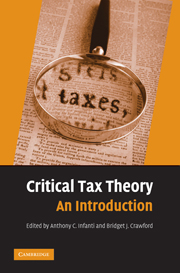Book contents
- Frontmatter
- Contents
- List of Illustrations
- List of Tables
- List of Contributors
- List of Common Abbreviations
- Introduction
- CHAPTER 1 FOUNDATIONS OF CRITICAL TAX THEORY
- CHAPTER 2 HISTORICAL PERSPECTIVES ON TAXATION
- CHAPTER 3 THE GOALS OF TAX POLICY
- CHAPTER 4 CRITICAL TAX THEORY MEETS PRACTICE
- CHAPTER 5 RACE AND TAXATION
- CHAPTER 6 GENDER AND TAXATION
- Not Color- or Gender-Neutral: New Tax Treatment of Employment Discrimination Damages
- Taxing Housework
- The Marital Deduction QTIP Provisions: Illogical and Degrading to Women
- A Taxing Woman: The Relationship of Feminist Scholarship to Tax
- CHAPTER 7 SEXUAL ORIENTATION AND TAXATION
- CHAPTER 8 THE FAMILY AND TAXATION
- CHAPTER 9 CLASS AND TAXATION
- CHAPTER 10 DISABILITY AND TAXATION
- CHAPTER 11 GLOBAL CRITICAL PERSPECTIVES ON TAXATION
- CHAPTER 12 CRITICAL PERSPECTIVES ON CRITICAL TAX THEORY
- Index
Not Color- or Gender-Neutral: New Tax Treatment of Employment Discrimination Damages
Published online by Cambridge University Press: 04 August 2010
- Frontmatter
- Contents
- List of Illustrations
- List of Tables
- List of Contributors
- List of Common Abbreviations
- Introduction
- CHAPTER 1 FOUNDATIONS OF CRITICAL TAX THEORY
- CHAPTER 2 HISTORICAL PERSPECTIVES ON TAXATION
- CHAPTER 3 THE GOALS OF TAX POLICY
- CHAPTER 4 CRITICAL TAX THEORY MEETS PRACTICE
- CHAPTER 5 RACE AND TAXATION
- CHAPTER 6 GENDER AND TAXATION
- Not Color- or Gender-Neutral: New Tax Treatment of Employment Discrimination Damages
- Taxing Housework
- The Marital Deduction QTIP Provisions: Illogical and Degrading to Women
- A Taxing Woman: The Relationship of Feminist Scholarship to Tax
- CHAPTER 7 SEXUAL ORIENTATION AND TAXATION
- CHAPTER 8 THE FAMILY AND TAXATION
- CHAPTER 9 CLASS AND TAXATION
- CHAPTER 10 DISABILITY AND TAXATION
- CHAPTER 11 GLOBAL CRITICAL PERSPECTIVES ON TAXATION
- CHAPTER 12 CRITICAL PERSPECTIVES ON CRITICAL TAX THEORY
- Index
Summary
To support a host of tax giveaways offered as a palliative to small businesses required to pay a higher minimum wage, Congress eliminated a venerated Code provision that supported exclusion from gross income of damages received on account of race- and gender-based employment discrimination. Congress's 1996 amendment of § 104(a) erased seventy years of tax history by limiting tax-free damages awards to only those arising from a physical injury. The amended section reverses case law and administrative rulings of the IRS that interpreted the term “personal injury” broadly to include awards for defamation, alienation of affection, violation of an employee's civil rights, and certain types of employment discrimination claims.
This article explores the ways in which Congress's amendment of § 104(a) exacerbates race-, gender-, and worker-based biases already embedded in the rules regarding taxation of employment discrimination damages. Many tax scholars view the pre-amendment version of the section, which provided a tax exemption for physical and nonphysical personal injuries, as a departure from accepted notions of the ideal income tax base. These scholars find the historical tax exclusion for employment discrimination damages akin to a subsidy or tax expenditure, not justifiable as a structural component of a tax that operates on income net of the costs of earning or producing that income. However, other scholars defend the exclusion because it promotes social justice concerns. I side with the latter group but for somewhat different reasons. Tax-free treatment of employment discrimination damages furthers society's antidiscrimination goals by acknowledging the harm of job bias and reflects true income measurement for workers by acknowledging a setoff for investment in human capital.
- Type
- Chapter
- Information
- Critical Tax TheoryAn Introduction, pp. 155 - 161Publisher: Cambridge University PressPrint publication year: 2009
- 1
- Cited by



